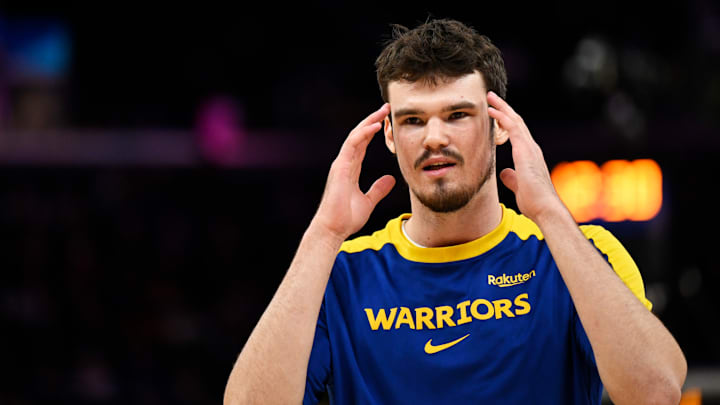Quinten Post was phenomenal for the Golden State Warriors over the final months of the regular season, before becoming far less impactful in the playoffs where the franchise was ultimately eliminated by the Minnesota Timberwolves.
The decline in form during the postseason isn't surprising for a rookie who was taken 52nd overall in last year's draft, but it does leave the Warriors with a decision to make on Post's future in the coming weeks.
The Warriors have a delicate Quinten Post contract decision
After starting the season on a two-way contract, Post earned a guaranteed deal and a place on the main roster almost immediately after the 4-for-1 Jimmy Butler trade. As part of that contract, Post also got a $2 million deal for next season with a team option that Golden State have to decide on by the end of June.
Given Post's production and value over the the second-half of the season, it's easy to suggest that the Warriors will simply pick up the team option and confirm another roster spot heading into free agency.
However, Mike Dunleavy Jr. and the front office will have to determine whether or not to take a more long-term approach, with the potential that they decline the option and re-sign Post on a multi-year deal as @GSWCBA on X (formerly Twitter) outlined back in early March.
Warriors have a $1.96M team option on Quinten Post for next season.
— GSWCBA (@gswcba) February 28, 2025
They can decline it this off-season and re-sign him up to a 4yr deal starting at $2.4M through Non-Bird rights (or more using the MLE).
Otherwise, accept it and he becomes an RFA in 2026 with Early Bird rights. https://t.co/joHwua1CCL
Taking the decline and re-sign route may mean that Golden State give Post more money than originally planned next season, but that they'll end up paying less over the next three or four years. If the 25-year-old were to continue stamping himself as one of the best seven-foot shooters in the entire league, then he could well get offers of over $10 million per season as a restricted free agent next year.
The problem will come if Post stagnates or even goes backward, then the Warriors could be stuck with a player on a multi-year deal that they don't particularly want and that holds little-to-no trade value.
Regardless, this might come down to Post and his camp more so than Golden State's front office. Does the 52nd overall pick want to secure more money now over a three or four-year deal, or does he want to gamble on himself to have a big second season and secure even more money next year?
We've seen Jonathan Kuminga gamble on himself by reportedly turning down a five-year, $150 million extension prior to this season, something that could come back to haunt him despite a strong individual end to the team's playoff run.
Post's situation may not be as important given the money is at a far lower scale, yet it's nonetheless a problem the Warriors will have to solve in the next six weeks.
